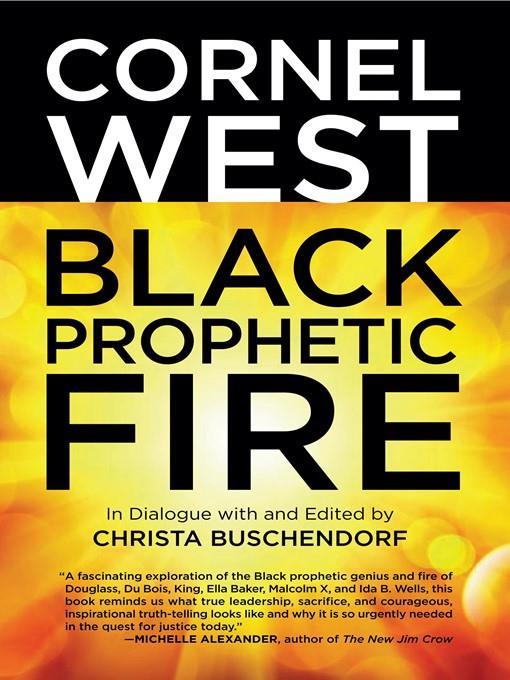
Black Prophetic Fire
کتاب های مرتبط
- اطلاعات
- نقد و بررسی
- دیدگاه کاربران
نقد و بررسی

August 11, 2014
Fearful that we may be “witnessing the death of black prophetic fire in our time,” historians West and Buschendorf engage in a book-length conversation about six historic figures–Frederick Douglass, W.E.B. DuBois, Martin Luther King Jr., Ella Baker, Malcolm X, and Ida B. Wells. The subtext is a critique of President Obama, whom West calls both “my dear brother” and the “friendly face of the American empire.” Along the way, West plays rhetorical catch-as-catch-can: Douglass was “probably the most eloquent ex-slave in the history of the modern world” but “so tied in to the machinations of the Republican Party and willing to make vulgar compromises”; DuBois was “the greatest... black intellectual ever to emerge out of the U.S. empire,” but uninterested in “serious wrestling with modernist texts”; “it is not in any way to put down the great Ida to acknowledge her middle-class context.” Putting aside West’s willfully provocative opinions, his mini-lectures, which frequently run uninterrupted for pages at a time, and Buschendorf’s instructive set-ups for them do convey a wealth of information. Readers with a serious interest in history will treasure the full-bodied appendices, including the content-rich notes and extensive bibliography.

August 1, 2014
Keeping the social conscience burning through six different models of African-American leadership. Spurred by the election of the first black president and the subsequent eruption of the Occupy Wall Street movement, accomplished, outspoken African-American scholar West (Pro+Agonist: The Art of Opposition, 2012, etc.) and fellow academic Buschendorf held several conversations between the summer of 2009 and January 2013 about the ongoing relevance of historic black figures. Moving from Frederick Douglass back to Ida B. Wells, the authors treat the towering and often uneven legacy of leaders who spoke out against injustice and even, like Martin Luther King Jr. and Malcolm X, died for their beliefs. West has long advocated for the importance of the "organic intellectual," one not afraid to come down from the ivory tower and mess with "grass-roots folk," and he admires in these six figures their relentless truth-speaking and ability to inspire others to action. Indeed, Malcolm X's parrhesia, or "fearless speech," in expressing black rage is West's ideal. Similarly, he admires a critic such as Wells, born a slave, who exposed in her investigative newspaper reporting the lynching going on in the South in the 1880s when others wouldn't touch the subject; or the galvanizing grass-roots leadership of Ella Baker, who resisted the charismatic style of King in favor of hands-on mobilizing and teaching and thus was a catalytic model for the Occupy movement. West bemoans the "deodoriz[ing]" of these radical figures-e.g., shying away from W.E.B. Du Bois' communist sympathies and the turn toward complicity with the white mainstream. The concluding section, "Last Words on the Black Prophetic Tradition in the Age of Obama," however, is lacking, as West aims his vitriol against the "cowardly capitulation of Black leadership to Obama's neoliberal policies," without a chance for vigorous rebuttal. Lively, heated, fighting words-self-serious but never dull.
COPYRIGHT(2014) Kirkus Reviews, ALL RIGHTS RESERVED.

November 1, 2014
In dialog with Christa Buschendorf, West takes a new look at six revolutionary black leaders: Frederick Douglass, W. E. B. Du Bois, Martin Luther King Jr., Ella Baker, Malcolm X, and Ida B. Wells.
Copyright 2014 Library Journal, LLC Used with permission.

September 15, 2014
Race and religion scholar West, in dialogue with history scholar Buschendorf, examines black leadership in the black prophetic tradition, as reflected in Frederick Douglass, W. E. B. Du Bois, Martin Luther King Jr., Malcolm X, and others. All raised their voices on behalf of a suffering people, speaking to power with systematic analysis and critique. Much of this work places the attributes, character traits, and practices of these prophetic personalities in contrast to contemporary leadership in the age of Obama. The we-centered focus with a broader social movement was at the core of these black prophetic personalities even when their individualism and charismatic attributes were prominent. Currently, the political realm appears dominated by black leadership focused on individual success at a time when issues of race and poverty are mostly ignored. Given that he does not view President Obama as part of the black prophetic tradition, West raises but never answers the question of Obama's contemporary interaction with such a tradition.(Reprinted with permission of Booklist, copyright 2014, American Library Association.)

























دیدگاه کاربران